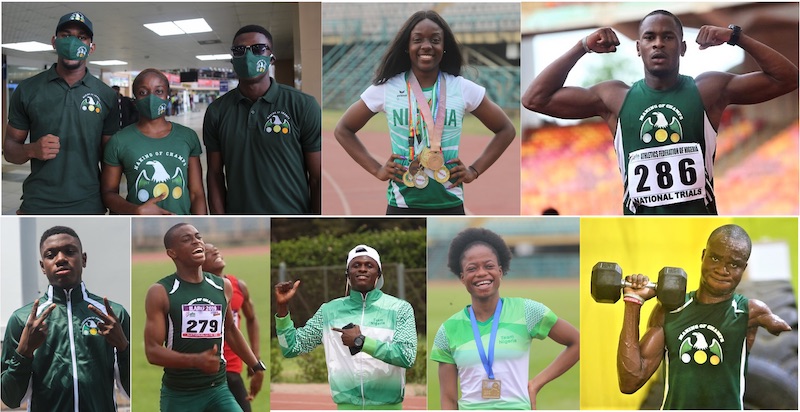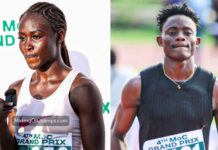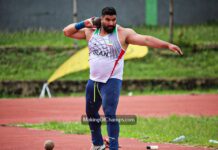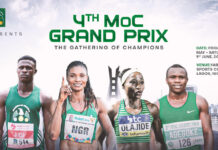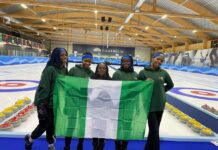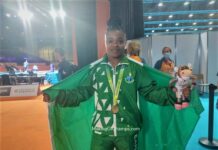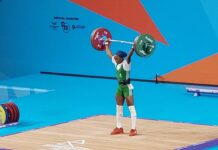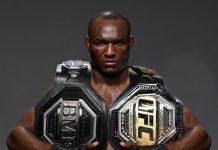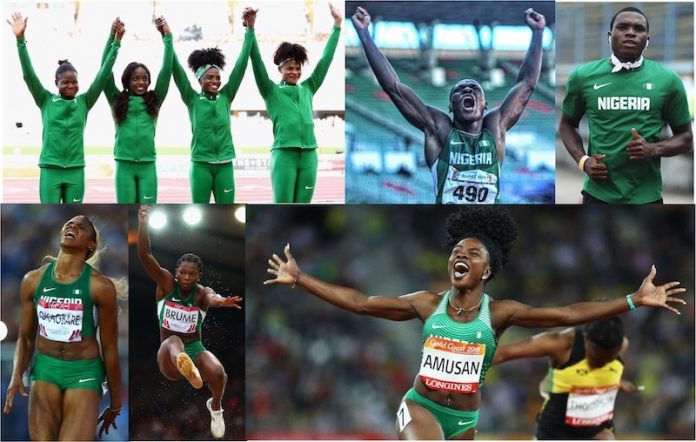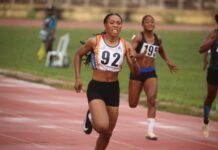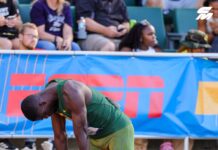In 2012, I was a Management Consultant at Bain & Company in South Africa not too long after completing my MBA at the Kellogg School of Management in the US, when the idea for Making of Champions (MoC) to help revive Olympic Sports in Nigeria came to me. I had excitedly taken a 2-week vacation from work to travel back to the UK, where I had grown up and spent most of my adult life, to witness the London Olympics firsthand.
If I thought that I was going to enjoy following Team Nigeria at the Games, I couldn’t have been more wrong – the 2012 Olympics would be the first Games since Seoul ’88 that Team Nigeria returned without a single medal. In fact, my enduring memory from London 2012 was witnessing Team USA hit an Olympic scoring record against D’Tigers, Nigeria’s men’s basketball team. I returned to South Africa after the Olympics thinking about why Nigeria’s Olympic star had dimmed so dramatically and what could be done about it.
Like many Nigerians in my generation, I grew up witnessing great Olympic success for the nation – Nigeria’s first Olympic medal in Athletics (Track Field) in the Men’s 4x400m at Los Angeles ’84 was only Nigeria’s fourth Olympic medal overall. To date Nigeria has won 25 Olympic medals in total, with 13 of them coming from Athletics, but crucially since 2008 the nation has only 1 Olympic Medal – Football Bronze at Rio 2016. So what went wrong? Why were the two decades from 1990 to 2010 the zenith of Nigeria’s global sporting success, and how could the nation begin to restore its Olympic pride?
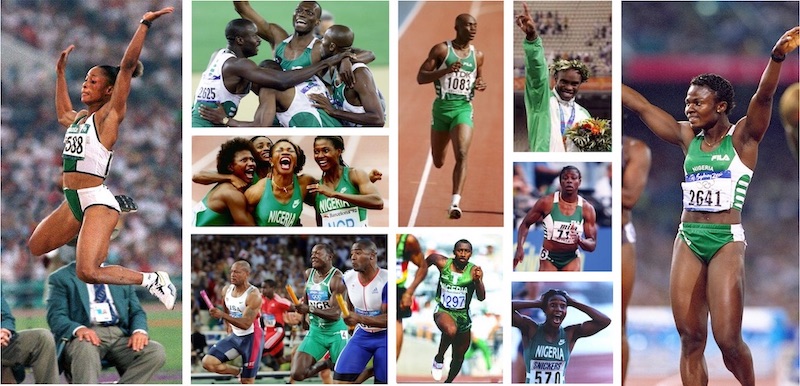
Interestingly, one of the key reasons Nigeria did so well at the Olympics from Barcelona ’92 until Beijing 2008 was the support of major Corporate Sponsorship in Athletics. In the 2 decades from 1990 to 2010, the word ‘Mobil’ was synonymous with Nigeria’s annual Track & Field Olympic Trials – those were the exact years that Exxon Mobil was the Title Sponsors of the event, when it undoubtedly was one of the Top 5 National Trials in the world, up there in quality of performance with the likes of USA, Canada, Great Britain and Jamaica. 20 of Nigeria’s Olympic Medals in history out of 25 were won within that 21-year period.
The connection between Mobil’s lead sponsorship of Athletics in Nigeria and Olympic success is undeniable. Unfortunately, the great impact Mobil had on Nigeria’s Olympic movement was not a narrative that was clearly and widely articulated, and the benefits to the brand of remaining behind Athletics began to wane. Amidst rumors that prize money which was meant for the Athletes was no longer reaching them, Mobil pulled the plug on their support of the National Trials in 2011. It is no surprise that Nigeria hasn’t won a single Olympic medal in Athletics since the Beijing 2008 Olympics.
Nigerian Athletics has not had a major long term Corporate Sponsor since then – this has led to a decline in the sport in Nigeria and has seen the mass exodus in the last decade of Nigeria’s best talent to represent other countries such as Qatar and Bahrain. Today, the World 400m Champion and third fastest woman in history in the quarter-mile is Salwa Eid Naser. In 2013, she was known as Ebelechukwu Agbapounwu before she left Nigeria for Bahrain. As part of a quartet of Nigerian-born Athletes, she inspired Bahrain to Bronze in the first ever Mixed 4x400m (2 men & 2 women per team) at the World Championships in 2019. I coined the term ‘Bahrain Drain’ as far back as 2016, when we discovered that Bahrain’s whole track team at the World U20 Championships were Nigeria-born.
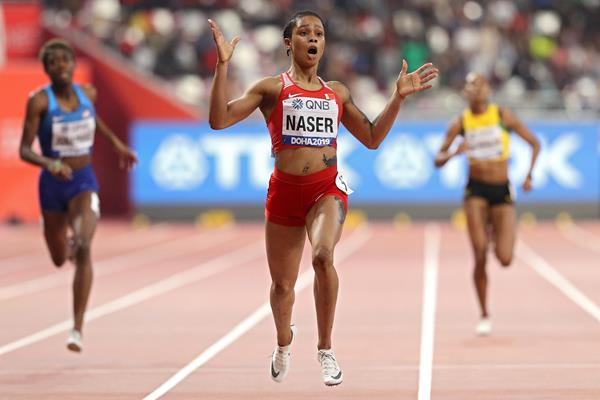
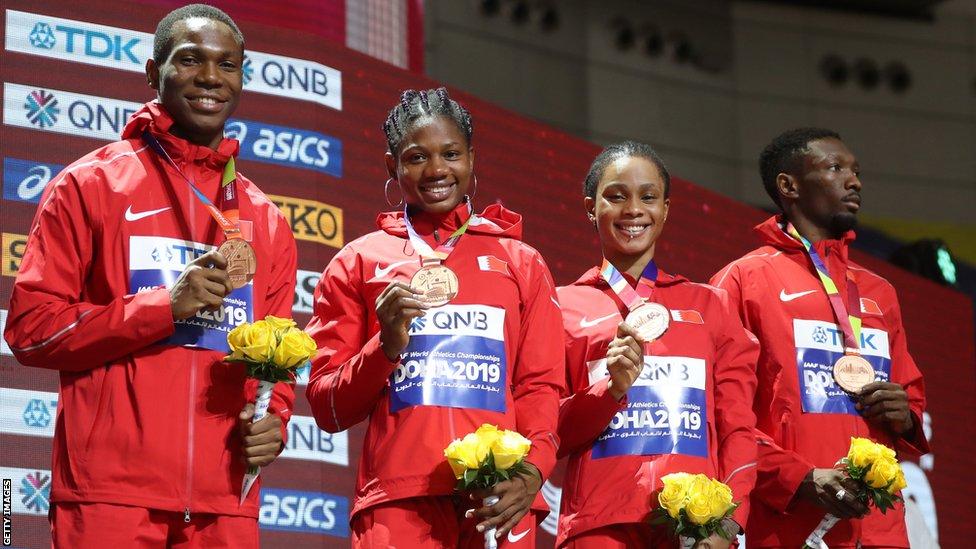
Though the work we do at MoC is now helping to turn the tide in Nigeria, at the time most of these Athletes had to seek greener pastures elsewhere to have meaningful careers. Gone are the days all of Nigeria’s Athletes globally had to rush back home every year for the highly anticipated Mobil Trials to ensure selection for Team Nigeria. Gone are the days when Nigeria could expect to have two men in the 100m or 200m Finals at the Olympics, like at Atlanta ’96 or Barcelona ’92. Gone are the days when Nigeria was always a medal contender in the Olympic Relays – 8 of Nigeria’s 13 Athletics Medals in Olympic history were in the Relays. Indeed, Nigeria has won medals in all 4 Relays that have appeared at the Olympics so far – men’s & women’s 4x100m and 4x4x00m. Relay medals are the most obvious for Nigeria to target to return to winning ways at the Olympics.
The good news for Nigeria is that there is light at the end of the tunnel. Despite a difficult decade in the doldrums relative to the two decades prior, a new generation of Athletes are showing the promise that could make Tokyo the nation’s best Olympic showing since Atlanta ’96, where Nigeria won 4 medals in Athletics and 6 medals in total. In 2019, Ese Brume won Nigeria’s first World Championship Medal in 6 years in the Long Jump, while Tobi Amusan narrowly missed out on a medal in the 100m Hurdles – they will likely be Nigeria’s greatest individual medal hopefuls in Tokyo, but don’t count out the likes of Divine Oduduru and Blessing Okagbare to contest for 100m or 200m medals.
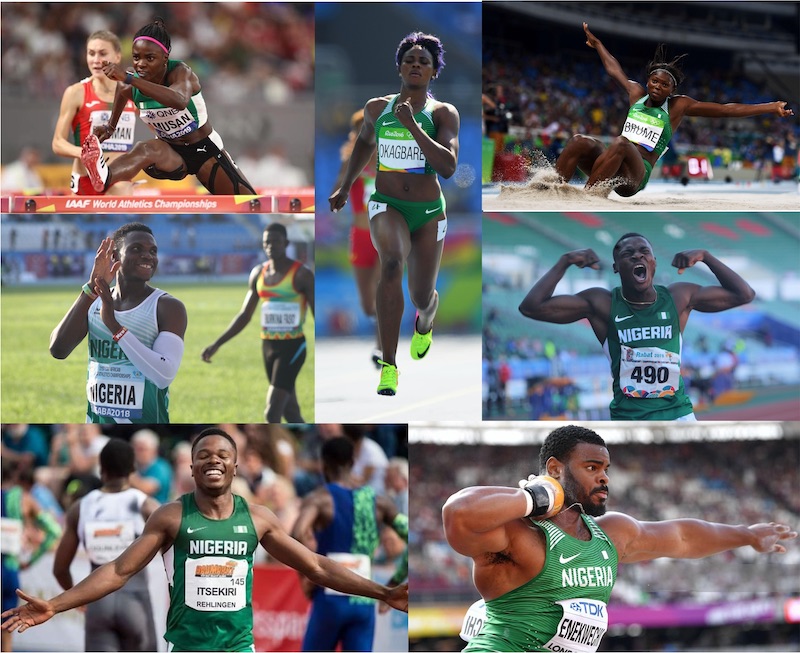
Nigeria could well win 5 Medals in Athletics at the Tokyo Olympics (at least 2 Individual medals and up to 3 Relay medals), but this would not happen by chance – as a nation we must have a flawless preparation to bring our Relay Teams to train and compete together despite the challenges posed by the ongoing pandemic. Nigeria could actually contest for all 5 Relay Medals in Tokyo but not without putting in the work – South Africa’s sprinters were already in Relay Camps together even before the coronavirus pandemic, while Nigeria’s 4x100m men lost to Team Ghana at the 2019 African Games, despite having the faster 100m sprinters on paper. Without adequate preparation, another barren Olympic Games for Nigeria in the Relays would be inevitable.
I am pleased to say that Making of Champions (MoC) has played a major role in reviving Nigerian Athletics. It wasn’t long after the 2012 Olympic Games that fate would set me on the path to founding MoC. My next project at Bain after returning from my London 2012 Olympic vacation would be in Nigeria and this coincided with the Eko 2012 National Sports Festival in Lagos – I decided to make a documentary to show Nigeria’s great potential at the Olympics and how it could be realized. At Eko 2012, I met many of Nigeria’s Olympic greats for the first time, particularly the nation’s only Double Olympic Medallists in history – Mary Onyali, Falilat Ogunkoya and Enefiok Udo-Obong.
https://www.facebook.com/makingofchamps/videos/2882343171852670
The journey of making the film would eventually take me across the world to meet more Nigerian Olympic Medallists, from Innocent Egbunike in the US, to Glory Alozie in Spain and Francis Obikwelu in Portugal. Thanks to all of their inspiring stories the production eventually became the feature-length docufilm Making of Champions: “The History” – the story of Nigeria’s Rise & Fall at the Olympics, debuting at the iREP Documentary Film Festival in 2014.
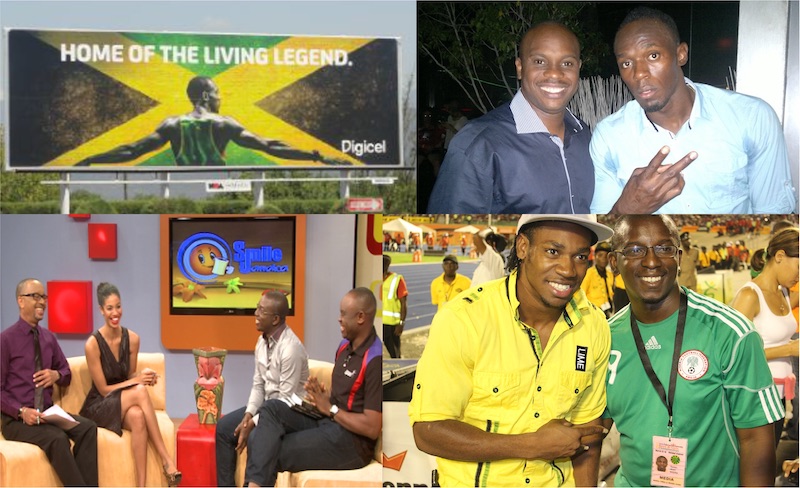
Much of the film was shot in Jamaica during their annual Secondary School ‘CHAMPS’ to learn the secrets of their incredible Olympic success, and what we saw there gave me the conviction that Nigeria has all the talent and resources to replicate and even surpass the Olympic feats achieved by the likes of USA and Jamaica – we met many Athletics experts in both nations who know this about Nigeria’s potential and told us as much, even though we as a nation don’t know this about ourselves. The making of the film is ultimately what inspired me to leave my job in South Africa and move back to Nigeria to found MoC in 2013.
We launched MoC Track Club in Lagos in 2016, under the tutelage of Olympic Medallists Deji Aliu and Glory Alozie, who serve as our Head Sprints Coach and Sprint Hurdles Coach respectively. Since then we have trained a promising group of young Athletes, many of whom are on track to appear at their first Olympics in Tokyo. Promising talents such as National 100m Champion Joy Udo-Gabriel, National 400m Champion Emmanuel Ojeli and National 200m Silver Medallist Jerry Jakpa are all strong contenders to make their Olympic debuts in Tokyo, and they are all key members of Nigeria’s Relay teams already, each having won medals or set records for Team Nigeria in the Relays in 2018 and 2019.
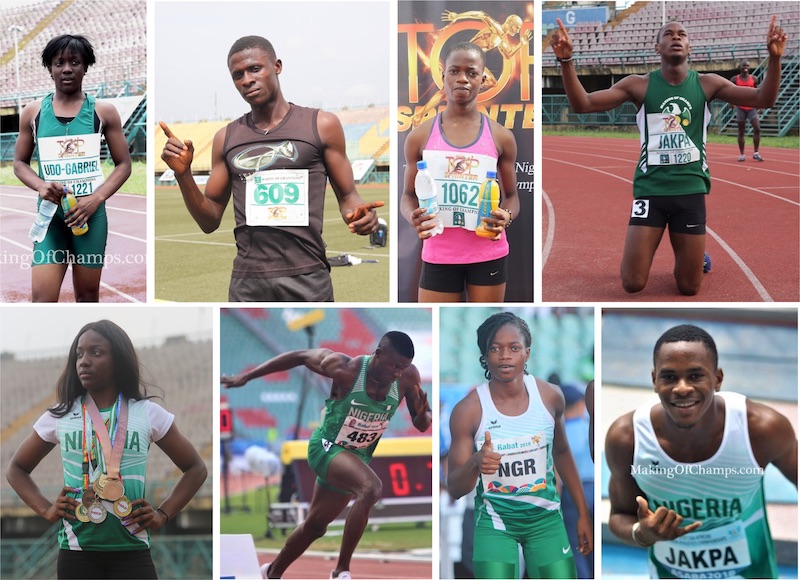
(L-R: Joy Udo-Gabriel, Emmanuel Ojeli, Blessing Oladoye, Jerry Jakpa)
Udo-Gabriel, Ojeli and Jakpa are part of Nigeria’s next generation of Olympians – already ranked well within the Top 100 Athletes globally in their respective events, they are currently in strong Olympic qualifying positions – the national call for Tokyo does seem to beckon for them. With a good preparation in the next 6 months, Nigeria’s best Athletes at home and abroad could combine well to bring home up to 5 Olympic medals. Will it happen? Nigeria has every chance to make history and usher in a new era of success at the Olympics. As for our top Athletes at Making of Champions, they are already among Nigeria’s best Athletes at home or abroad, and they would be very proud to be part of that new era of success for Team Nigeria from the Tokyo 2020 Olympics and beyond!
